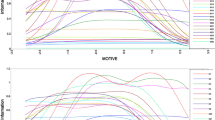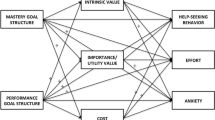Abstract
Gender and motivation in high school mathematicsclass were examined by using an expectancy-valueframework. There were 366 students (146 males, 212females)from a school with an enrollmentof approximately 1900 students (81% Caucasian, 8% NativeAmerican, 5% Hispanic, 4% African American, and 2%Asian). These students completed a questionnaireconsisting of 92 items which measured students'situation-specific goals (4 subscales), task-specific values (3subscales), task-specific beliefs (3 subscales), andgender self-schemata (2 subscales). Students' percentagegrade in math and selfreported effort in math class were the dependent variables. The three sets oftask-specific variables each accounted for between 11%and 14% of variance in achievement, while the genderself-schemata variables contributed another 2%. Task-specific goals were much strongerpredictors of effort than any other set of variables. Anunexpected finding was that, for both males and females,endorsing the stereotype that mathematics is a male domain was negatively related to reportedeffort. There were also differences in the prediction ofachievement and effort based on gender and math classtype (required or elective). Several path models supported these results.
Similar content being viewed by others
REFERENCES
Ames, C., & Archer, J. (1988). Achievement goals in the classroom: Students' learning strategies and motivation processes. Journal of Educational Psychology, 80, 260–267.
Archer, J. (1989). The relationship between gender-role measures: A review. British Journal of Social Psychology, 28, 173–184.
Ballard-Reisch, D., & Elton, M., (1992). Gender orientation and Bem Sex Role Inventory: A psychological construct revisited. Sex Roles, 77, 291–306.
Bem, S. L. (1977). On the utility of alternate procedures for assessing psychological androgyny. Journal of Consulting and Clinical Psychology, 42, 155–162.
Bem, S. L. (1981). Bem sex role inventory professional manual. Palo Alto, CA Consulting Psychologist Press.
Cohen, J., & Cohen, P. (1983). Applied multiple regression /correlation analysis for the behavioral sciences (2nd ed.). Hillsdale, NJ: Erlbaum.
Dweck, C. (1986). Motivational processes affecting learning. American Psychologist, 41, 1040–1048.
Eccle s, J. S. (1984). Sex differences in achievement patterns. In T. Sondereggar (Ed.), Nebraska Symposium on Motivation (Vol. 32). Lincoln: University of Nebraska Press.
Eccles, J. S. (1987). Gender roles and women's achievement-related decisions. Psychology of Women Quarterly, 11, 135–172.
Eccles, J. S., Adler, T., & Meece, J. L. (1984). Sex difference s in achie vement: A test of alternate theories. Journal of Personality and Social Psychology, 46, 26–43.
Eccles, J. S., Adler, T. F., Futterman, R., Goff, S. B., Kaczala, C. M., Meece, J. L., & Midgley, C. (1983). Expectancies, values and academic behaviors. In J. T. Spence (Ed.), Achievement and achievement motives. San Francisco: W. H. Freemen.
Eccles, J. S., Wigfield, A., Harold, R. D., & Blumenfeld, P. (1993). Age and gender differences in children's self and task perceptions during elementary school. Child Development, 64, 830–847.
Eccles, J. S., & Wigfield, A. (1995). In the mind of the actor: The structure of adolescents' achievement task values and expectancy-related beliefs. Society for Personality and Social Psychology Bulletin, 21, 215–225.
Feather, N. T. (1988). Values, valences, and course enrollment: Testing the role of personal values within an expectancy-valence framework. Journal of Educational Psychology, 80, 381–391.
Fennema, E. (1994, April). Old and new persp ectives: On gender and mathematics. Paper presented at the annual meeting of the American Educational Research Association, New Orleans, LA.
Fennema, E., Carpenter, T. P., Jacobs, V.R., Franke, M. L.,& Levi, L.W. (1998).A longitudinal study of gender differences in young children's mathematical thinking. Educational Researcher, 27, 6–11.
Fennema, E., & Peterson, P. (1985). Autonomous learning behavior: A possible explanation of gender-related differences in mathematics, In L. C. Wilkinson & C. B Marret (Eds.), Gender influences in classroom interaction. New York: Academic Press.
Gill, S., Stockard, J., Johnson, M., & Williams, S. (1987). Measuring gender differences: The expressive dimension and critique of androgyny scales. Sex Roles, 17, 375–400.
Greene, B. A., & Miller, R. B. (1996). Influences on course achievement:Goals, and Perceived ability, and cognitive engagement. Contemporary Edu cational Psychology, 21, 181–192.
Handal, P. J., & Salit, E. D. (1988). The relationship of gender role to positive and negative aspects of adjustment: A function and type of scoring method. Journal of Social Behavior and Personality, 3, 49–62.
Handel, R. D. (1986, April). Achievement attitudes in mathematics and science: Relationship between self-perceptions, aspirations, and extra-curricular activities. Paper presented at the annual meeting of the American Educational Research Association, San Francisco, CA.
Lent, R. W., Lopez, F. G., & Bieschke, K. J. (1991). Mathematics self-efficacy: Sources and relation to science-based career choice. Journal of Counseling Psychology, 38, 424–430.
Licht, B. G., & Dweck, C. (1983). Sex differences in achievement orientation: consequences for academic choices and attainments. In M. Marland (ed.), Sex differentiation and schooling. London: Heinemann Educational Books.
Maehr, M. L. (1984). Meaning and Motivation. In R. Ames & C. Ames (Eds.), Research on motivation in ed<nt> </nt>ucation (Vol. 1). New York: Academic Press.
Marsh, H. W. (1989). Age and sex effects in multiple dimensions of self-concept: preadolescence to early adulthood. Journal of Educational Psychology, 81, 417–430.
Meece, J. L., Blumenfeld, P. C., & Hoyle, R. H. (1988). Students' goal orientations and cognitive engagement in classroom activities. Journal of Educational Psychology, 80, 514–523.
Meece, J. L., Wigfield, A., & Eccles, J. S. (1990). Predictors of math anxiety and its consequences for young adolescents' course enrollment intentions and performances in mathematics. Journal of Educational Psychology, 82, 60-70.
Miller, R. B., Greene, B. A., Montalvo, G. P, Ravindran, B., & Nichols, J. D. (1996). Engagement in academic work: The role of learning goals, future consequences, pleasing others and perceived ability. Contemporary Educational Psychology, 21, 388–422.
Mills, C. J., Ablard, K. E., & Stumpf, H. (1993). Gender differences in academically talented young students' mathematical reasoning: Patterns across age and subskills. Journal of Educational Psychology, 85, 340–346.
Noddings, N. (1998). Perspectives from feminist philosophy. Educational Researcher, 27, 17–18.
Nolen, S. B. (1988). Reasons for studying: Motivational orientations and study strategies. Cognition and Instruction, 5, 269–287.
Pajares, F. (1996). Self-efficacy beliefs and mathematical problem-solving. Contemporary Educational Psychology, 21, 325–344.
Parson, J. E., Meece, J. L., Adler, T. F., & Kaczala, C.M. (1982). Sex differences in attributional patterns and learned helplessness? Sex Roles, 8, 421–432.
Pintrich, P. R., & Garcia, T. (1991). Student goal orientation and self-regulation in the college classroom. In M.L. Maehr & P.R. Pintrich (Eds.), Advances in motivation and achievement (Vol. 7). Greenwich, CT: JAI Press.
Rathbone, S. A. (1989, February). Gender differences in attitudes toward mathematics between low-achieving and high-achieving fifth grade elementary students. Paper presented at the annual meeting of the Eastern Educational Research Association, Savannah, GA.
Santrock, J. W. (1994). Gender. In Child Development (6th ed.). Madison, WI: Brown and Bench.
Schunk, D. H. (1989). Self-efficacy and cognitive skill learning. In C. Ames & R. Ames (Eds.), Research on motivation in education.Vol. 3: Goals and cognitions (pp. 13–44). San Diego, CA: Academic Press.
Schutz, P. A., & Lanehart, S. L. (1992, April). The relationship between long-term educational goals, learning strategies and academic performance. Paper presented at the annual meeting of the American Educational Research Association, San Francisco, CA.
Schutz, P. A. (1993, April). Long-term educational goals, learning strategies use and academic performance for high school students. Paper presented at the annual meeting of the American Educational Research Association, Atlanta, GA.
Wigfield, A. (1994). Expectancy-value theory of achievement motivation: A developmental perspective. Educational Psychology Review, 6, 49–78.
Wigfield, A., & Eccles, J. S. (1992). The deve lopment of achie vement task values: A theoretical analysis. Developmental Review, 12, 265–310.
Zimmerman, B. J., & Martinez-Pons, M. (1990). Student differences in self-regulated learning: Relating grade, sex, and giftedness to self-efficacy and strategy use. Journal of Educational Psychology, 82, 51–59.
Rights and permissions
About this article
Cite this article
Greene, B.A., Debacker, T.K., Ravindran, B. et al. Goals, Values, and Beliefs as Predictors of Achievement and Effort in High School Mathematics Classes. Sex Roles 40, 421–458 (1999). https://doi.org/10.1023/A:1018871610174
Issue Date:
DOI: https://doi.org/10.1023/A:1018871610174




